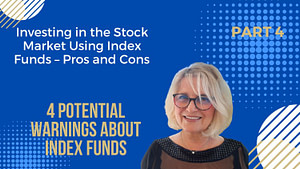
In this article, the PART 4 of this series, I’ll cover 4 Potential Warnings about Index Funds’ Investing.
You can read previous articles of this series – PART 1, PART 2, and PART 3 – as a reference for this one.
You may have noticed that Investing in index mutual funds and ETFs gets a lot of positive press, and rightly so.
Index funds, at their best, offer a low-cost way for investors to track popular market indexes.
In many cases, index funds outperform the majority of actively managed mutual funds.
One might think investing in index products is a no-brainer. LOL
Not surprisingly, the providers of mutual funds and exchange traded funds (ETFs) have created a bunch of new index products in response to the popularity of index investing.
With this being said, I want to share with you 4 things you must know about index funds as you plan your investment strategy.
1. Not All Index Funds Are Cheap
People who work for large corporations often have the opportunity to invest in low-cost index funds offered in 401(k) plans that offer institutional shares of certain funds.
If your 401(k) plan contains index funds from providers such as Vanguard Group or Fidelity Investments, you can be pretty confident that these are low-cost.
Both funds from these families offer share classes with even lower expense ratios and also offer a full range of index funds across various stock and bond asset classes.
Unfortunately, 401(k) plans do not always offer index funds that cheap.
This may be true if your plan provider is an insurance company or brokerage firm that offers its own proprietary funds.
While the advice to focus on index funds in your 401(k) plan is often sound, make sure that you look at the index funds offered in your plan to ensure that you are making the best choices.
For 401(k) participants who are fortunate enough to have a selection of several low-cost index funds, the advantage over higher-cost active funds can be significant.
2. Not All Indexes Are Created Equal
There is a wide range of low-cost index mutual funds and ETFs that cover widely used market indexes – domestic and foreign stock indexes.
However, just because a fund says index fund in its name, doesn’t necessarily mean it tracks the underlying index or sector exactly.
When screening for an index fund, it’s important to remember that not all index funds labeled “S&P 500” or “Wilshire 5000” follow those indexes.
Some funds can have divergent management behavior. In other words, a portfolio manager may add stocks to the fund that are similar to what’s in the index.
It’s important for investors to analyze the holdings of an index fund before investing to determine whether it’s a true index fund or a fund that has an index-like name.
Also, it’s important to understand the investment manager’s goal for the index fund and what holdings or investments are included in order to reach that goal.
If the goal is considered aggressive, the fund’s investments might deviate from the underlying index.
The need to consider fees becomes even more important relative to increased risk factors—fees reduce the amount of return received for the risks taken.
3. Index Funds Don’t Necessarily Reduce the Risk of Loss
Investors in an index fund or ETF tracking the S&P 500 during a bear market in stocks will experience losses just like the index.
In a broad-based selloff like we experience now, investors in other index products tracking real estate in the form of a real estate investment trust (REIT) or emerging market stocks could suffer large losses as well.
Index fund investors do, however, eliminate management risk.
This is the risk of an active manager underperforming the benchmark associated with their investment style due to the investment choices they make in managing the fund.
While occasional adjustments to the index funds do not impact most buy-and-hold investors, informed investors should stay on top of their index funds’ holdings for changes like this, as mutual fund providers continue to compete on price.
4. Index Funds Don’t Ensure Investment Success
Just investing in an index fund or two doesn’t mean that you’re on your way towards achieving your investment or financial planning goals.
Index funds are tools just like any other investment product.
In order to gain the most benefit from using index funds either exclusively or in combination with Stocks and ETFs, you need to have an investing strategy.
Index funds work quite well as part of an asset allocation plan.
Many financial advisers put together portfolios of index funds that are allocated in line with their client’s risk tolerance and their financial plan.
Others may use a “core and explore” approach where index funds make up much of the portfolio (the core) with selected active funds and individula stocks to hopefully enhance returns (the explore portion).
Bottom Line:
- Investing in index mutual funds and ETFs can be an excellent low-cost strategy for all or a part of your investment portfolio.
- Index funds are a popular strategy for investors who seek passive index strategies as opposed to active management.
- Index funds have several benefits including lower costs, broad-based diversification, and lower taxes.
- Investors in in dex funds must be discerning since not every fund is low-cost, and some may be better at tracking an index than others.
- Owning an index does not mean you are immune from risk or losses if the markets take a downturn.
- Like with any other investment strategy, investing in index funds requires that you understand what you are investing in.
- Not all index products are the same and investors need to look beyond the “index fund” label to ensure they are truly investing in a low-cost product that tracks a benchmark that fits with their investing strategy.
That’s the last article in the 4-part series about investing in Index funds.
Hope this series was helpful & useful for you if you considering investing in Index funds.
Please post any questions, opinions, insights in the comments to this article.
Thank you for reading!
You are blessed – stay in your power….
To your Health, Wealth, and Freedom.

